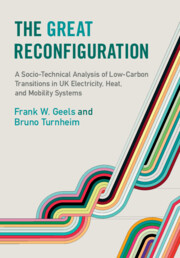‘To protect the climate the world needs a massive transformation in its energy system. Policy makers and scholars need reliable guides from history for how those transformations can occur. Here is that guide — a book steeped in rich detail about how the world really works along with a fresh look at the big picture of how transformations come from interlocking technological and social processes.’
‘One of the most analytically rich and robust assessments of low-carbon transitions I have ever seen...The comparative treatment of heat, electricity, and mobility is compelling and apt, the connections to broader issues of climate governance or system reconfiguration strong. Ground-breaking in its conceptualising but down-to-earth in its policy implications, I recommend this for students and professional researchers alike.’
‘A rapid reconfiguration of large parts of the global economy is now essential for our survival. Geels and Turnheim look deeply into how such change can happen, what holds it back, and how we can speed it up. An essential guide.’
‘…Within the field of sustainability transitions research, the multilevel perspective of Geels, Turnheim, and colleagues is arguably the most influential approach. The Great Reconfiguration shows how taking into account the complex relationships among actors, technologies, and governance can help to identify opportunities for change that would otherwise be overlooked. This book is the definitive statement of the new developments in the multilevel systems approach and its contribution to transition policy research.’
‘…an impressive volume that offers remarkable insight into the progress made in decarbonising the electricity, heat, and mobility systems in the UK over the past three decades. The book’s strength lies in its comprehensive analysis of system realignment within and across these three crucial domains…It will interest both researchers and practitioners and reveals the power and analytical sweep of contemporary transition scholarship.
‘This book clearly shows the power of sustainability transition research for identifying ways to mitigate the climate crisis. It advances a new and important agenda through its focus on how multiple innovations reconfigure several systems. It pairs an excellent theoretical framing with rich and well-structured empirical cases. A must read for anyone interested in understanding how sustainability transitions happen.’
‘One of the most exciting additions to sustainability science over the last decade has come from the vibrant community of researchers exploring historical transitions in socio-technical systems. In The Great Reconfiguration, two leaders of that community offer a lucid summary and extension of the relevant theory, use that theory to explain the complex co-evolution of today’s interlinked production-consumption systems, and conclude with practical guidance for the interventions to promote more sustainable development pathways to the future.’
‘Now that most people agree that climate change is a real problem, the big debate is about how to solve it, and whether this demands marginal reforms to the economy, a wholesale revolution of industrial and capitalist society, or something lying between these two extremes. Relying on extensive empirical research, Geels and Turnheim convincingly map out a viable middle path — the reconfiguration of key production-consumption systems — that is already beginning to achieve the emissions reductions we need, while being politically pragmatic and feasible.’

